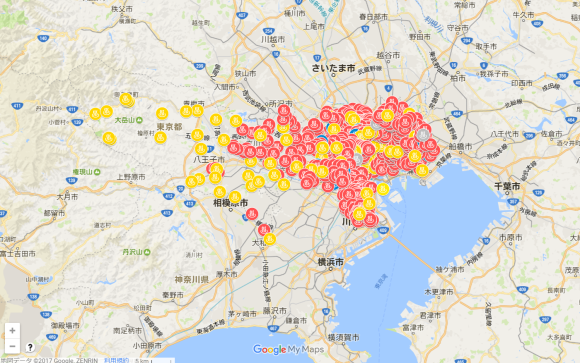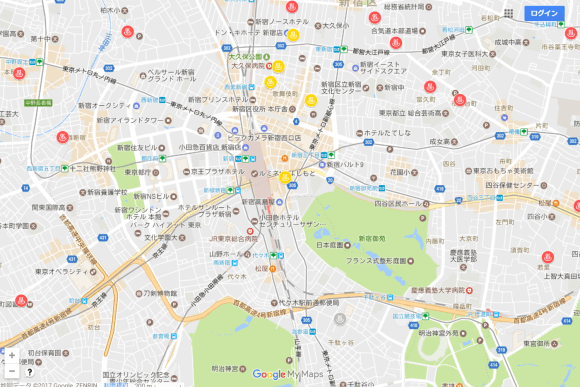Whether you’re a backpacker looking to clean yourself up or just want to experience this aspect of traditional Japanese culture, hundreds of options are at your fingertips.
Public baths, or sento, as they’re called in Japanese, used to be an ubiquitous part of Japanese cityscapes. Since the 1950s, though, infrastructure advancements have made private bathing facilities a part of almost every modern residence in Japan, and as a result the number of operating sento has been steadily declining.
After taking a long look at the writing on the wall, some public baths have decided to call it quits and convert themselves into other sorts of businesses. However, there’s been an uptick in sento interest recently, with some young adults being drawn to their retro atmosphere and the affordable luxury of a quick soak without having to travel out of the urban environment.
So to make speedy sento forays more convenient, Japanese Twitter user @mangetsu1129 began compiling a list of all the sento, super sento (larger-scale public baths), day-use hot springs, and saunas in Tokyo.
ついに完成しました!!
— 銭湯/公衆浴場研究家♨️ (@mangetsu1129) February 5, 2017
東京都のすべての銭湯、スーパー銭湯、日帰り温泉、サウナの情報をマップにまとめていました。たぶん初めて!
都内23区内、都下の市町村、伊豆諸島も追加し、約700軒の最新営業情報がグーグルマップ上で見られます♨https://t.co/TtIO2RD6k2 pic.twitter.com/QhdAXBJ4jw
Earlier this week, @mangetsu1129 announced that the list was complete, and contained information for roughly 700 facilities, covering not just within the 23 wards that make up central Tokyo, but also the cities, villages, and islands that are also officially part of Japan’s capital. And to make it easier to sort through all those sento, @mangetsu1129 has made the information available through Google maps.
Each location is shown by Japan’s traditional onsen (hot spring) mark (though not all sento source their waters from natural hot springs). Yellow marks indicate a sento, red marks a super sento, day-use hot spring, or sauna, and blue marks a facility that’s gone out of business or for some other reason isn’t currently in operation.
Clicking on a facility brings up a wealth of information in a column to the left of the map, including the sento’s name, address, hours of operation, and website. While prices are also listed for super sento and day-use hot springs, no mention of cost is given for regular sento, since almost all standard public baths in Tokyo have agreed to a uniform charge of 460 yen (US$4) for adults.
@mangetsu1129 plans to eventually expand the interactive sento map to a nationwide scale. For the time being though, if you’re interested in experiencing this part of traditional Japanese culture in Tokyo, you can find hundreds of options by firing up the sento Google map right here.
Source: IT Media, Twitter/@mangetsu1129
Insert images: Google Maps
Follow Casey on Twitter, where hopefully he’ll have something clever to say as soon as he gets out of the bath.



 Soup not soap: Japanese public bathhouses surviving by converting into retro-chic cafés
Soup not soap: Japanese public bathhouses surviving by converting into retro-chic cafés Apartments with no bath or shower rising in popularity among young Tokyoites, report says
Apartments with no bath or shower rising in popularity among young Tokyoites, report says Bathing with Pokémon? Healing species’ powers tapped for Pokémon Recovery public baths in Japan
Bathing with Pokémon? Healing species’ powers tapped for Pokémon Recovery public baths in Japan A guide to public bathhouses, the newest hot spot for tourists in Tokyo
A guide to public bathhouses, the newest hot spot for tourists in Tokyo Miniature sento bathhouse range is this season’s must-buy gacha capsule toy collection
Miniature sento bathhouse range is this season’s must-buy gacha capsule toy collection How to order snacks on a Shinkansen bullet train in Japan
How to order snacks on a Shinkansen bullet train in Japan Demon Slayer: Kimetsu no Yaiba gets new roller coaster attractions and food at Universal Studios Japan
Demon Slayer: Kimetsu no Yaiba gets new roller coaster attractions and food at Universal Studios Japan New samurai glasses are Japan’s latest weird must-have souvenir
New samurai glasses are Japan’s latest weird must-have souvenir Burger King Japan suddenly adds Dr. Pepper and Dr. Pepper floats to its menu nationwide
Burger King Japan suddenly adds Dr. Pepper and Dr. Pepper floats to its menu nationwide Nintendo history you can feel – Super NES, N64, and GameCube controllers become capsule toys
Nintendo history you can feel – Super NES, N64, and GameCube controllers become capsule toys High-fashion Totoro cuddle purse is like an elegant stroll in the forest【Photos】
High-fashion Totoro cuddle purse is like an elegant stroll in the forest【Photos】 Japan’s new difficult-to-drink-from beer glass protects your liver, but it’s a brutal experience
Japan’s new difficult-to-drink-from beer glass protects your liver, but it’s a brutal experience Kyoto Tower mascot termination reveals dark side behind cute Japanese characters
Kyoto Tower mascot termination reveals dark side behind cute Japanese characters New Pokémon ice cream, dessert drinks, and cool merch coming to Baskin-Robbins Japan【Pics】
New Pokémon ice cream, dessert drinks, and cool merch coming to Baskin-Robbins Japan【Pics】 To combat declining birth rate, Japan to begin offering “Breeding Visas” to foreigners
To combat declining birth rate, Japan to begin offering “Breeding Visas” to foreigners Hello, cosmetics! Clinique teams up with Hello Kitty this summer for first-time collaboration
Hello, cosmetics! Clinique teams up with Hello Kitty this summer for first-time collaboration “The most Delicious Cup Noodle in history” – Japan’s French Cup Noodle wins our heart【Taste test】
“The most Delicious Cup Noodle in history” – Japan’s French Cup Noodle wins our heart【Taste test】 Starbucks releases a cute Frappuccino and Unicorn Cake…but not in Japan
Starbucks releases a cute Frappuccino and Unicorn Cake…but not in Japan McDonald’s Japan’s Soft Twist Tower: A phantom ice cream only sold at select branches
McDonald’s Japan’s Soft Twist Tower: A phantom ice cream only sold at select branches Yabai Ramen: What makes this Japanese ramen so dangerous?
Yabai Ramen: What makes this Japanese ramen so dangerous? Finally! Nintendo Japan expands Switch 8-bit controller sales to everybody, Online member or not
Finally! Nintendo Japan expands Switch 8-bit controller sales to everybody, Online member or not Japanese government wants to build luxury resorts in all national parks for foreign tourists
Japanese government wants to build luxury resorts in all national parks for foreign tourists 10 things you should buy at 7-Eleven in Japan
10 things you should buy at 7-Eleven in Japan Studio Ghibli releases anime heroine cosplay dresses that are super comfy to wear
Studio Ghibli releases anime heroine cosplay dresses that are super comfy to wear Woman charged for driving suitcase without a license in Osaka
Woman charged for driving suitcase without a license in Osaka Studio Ghibli unveils My Neighbour Totoro miniature house model
Studio Ghibli unveils My Neighbour Totoro miniature house model Kyoto experiencing problems with foreign tourists not paying for bus fares, but not on purpose
Kyoto experiencing problems with foreign tourists not paying for bus fares, but not on purpose Fighting mild hunger with a Japanese soda that turns into jelly in the stomach【Taste test】
Fighting mild hunger with a Japanese soda that turns into jelly in the stomach【Taste test】 Studio Ghibli’s Howl’s Moving Castle tapestry unveiled in Japan for first time
Studio Ghibli’s Howl’s Moving Castle tapestry unveiled in Japan for first time McDonald’s new Happy Meals offer up cute and practical Sanrio lifestyle goods
McDonald’s new Happy Meals offer up cute and practical Sanrio lifestyle goods Sales of Japan’s most convenient train ticket/shopping payment cards suspended indefinitely
Sales of Japan’s most convenient train ticket/shopping payment cards suspended indefinitely Sold-out Studio Ghibli desktop humidifiers are back so Totoro can help you through the dry season
Sold-out Studio Ghibli desktop humidifiers are back so Totoro can help you through the dry season Japanese government to make first change to romanization spelling rules since the 1950s
Japanese government to make first change to romanization spelling rules since the 1950s Foreigner’s request for help in Tokyo makes us sad for the state of society
Foreigner’s request for help in Tokyo makes us sad for the state of society Ghibli founders Toshio Suzuki and Hayao Miyazaki contribute to Japanese whisky Totoro label design
Ghibli founders Toshio Suzuki and Hayao Miyazaki contribute to Japanese whisky Totoro label design Doraemon found buried at sea as scene from 1993 anime becomes real life【Photos】
Doraemon found buried at sea as scene from 1993 anime becomes real life【Photos】 Tokyo’s most famous Starbucks is closed
Tokyo’s most famous Starbucks is closed Princesses, fruits, and blacksmiths: Study reveals the 30 most unusual family names in Japan
Princesses, fruits, and blacksmiths: Study reveals the 30 most unusual family names in Japan 18 awesome overnight hot spring trips from Tokyo, and a quiz to help pick the best one for you
18 awesome overnight hot spring trips from Tokyo, and a quiz to help pick the best one for you Public baths in Japan add some extra fun with hundreds of rubber duckies
Public baths in Japan add some extra fun with hundreds of rubber duckies How not to bathe at a public bathing facility in Japan
How not to bathe at a public bathing facility in Japan Onsen in Nagano will now welcome foreigners with tattoos, as long as they patch ’em up
Onsen in Nagano will now welcome foreigners with tattoos, as long as they patch ’em up You can make your own hot spring bath at this river in central Japan【Japan travel】
You can make your own hot spring bath at this river in central Japan【Japan travel】 Mountain Dew opening the Mountain De Yu public bath house in Tokyo for Mountain Day
Mountain Dew opening the Mountain De Yu public bath house in Tokyo for Mountain Day Onsen hot spring with Mt Fuji views has one of the best rotenburo in Japan
Onsen hot spring with Mt Fuji views has one of the best rotenburo in Japan Free literal forest bathing in Hokkaido is a hot spring experience you’ll never forget【Photos】
Free literal forest bathing in Hokkaido is a hot spring experience you’ll never forget【Photos】 Tokyo likely to reduce age limit on kids in opposite-sex public baths, report says
Tokyo likely to reduce age limit on kids in opposite-sex public baths, report says The top five best multiple-hot-spring hotels in all of Japan
The top five best multiple-hot-spring hotels in all of Japan Japanese hot spring adds roaring Godzilla Invasion Cave, other kaiju-related relaxation options
Japanese hot spring adds roaring Godzilla Invasion Cave, other kaiju-related relaxation options We visit the 24-hour male-only sauna just outside of Hakata Station and ponder a strange sight
We visit the 24-hour male-only sauna just outside of Hakata Station and ponder a strange sight A private onsen bath with a karaoke machine is two of Japan’s best things with zero embarrassment
A private onsen bath with a karaoke machine is two of Japan’s best things with zero embarrassment Solaniwa Onsen: Kansai’s largest hot spring theme park is also one of its most beautiful
Solaniwa Onsen: Kansai’s largest hot spring theme park is also one of its most beautiful Japan’s first Finnish-style sauna facility with private rooms opens in Tokyo
Japan’s first Finnish-style sauna facility with private rooms opens in Tokyo
Leave a Reply